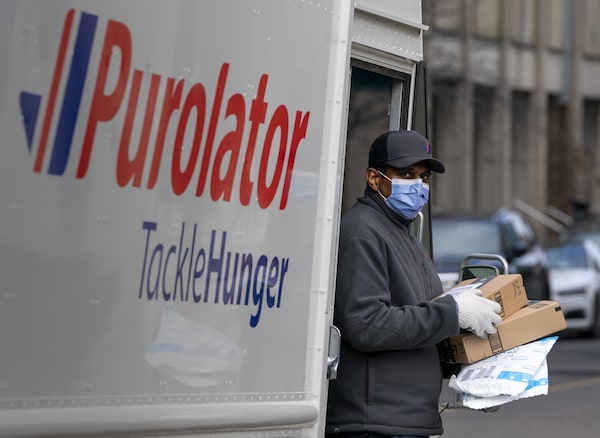Maple Leaf Foods workers wait to be immunized against COVID-19 at the company's Walker Drive plant in Brampton, Ont., April 28, 2021.ALEX UROSEVIC/MAPLE LEAF FOODS/Reuters
John Ferguson says his company could get an onsite vaccination clinic up and running in one of Canada’s most acute COVID-19 hotspots – west Toronto – with just 24 hours’ notice.
His firm – Purolator Inc. – is used to swift logistical operations. All he needs now is the go-ahead. “We have three priorities,” the president and chief executive officer said in an interview. “Vaccines, vaccines, and vaccines.”
Across Ontario, about 500 businesses have expressed interest in hosting a clinic. The majority do not meet the province’s criteria, which include having locations in hotspots and staff who can’t work at home, the Solicitor-General’s office says; so far, only a handful have been approved. Clinics began at meat processors Maple Lodge Farms and Maple Leaf Foods, and many employers are eager to follow suit. Efforts are hampered by slow decision-making from government, a low vaccine supply, and a lack of clear priority in targeting essential workplaces.
And yet experts agree that bringing vaccines to workplaces where employees can’t work remotely, especially in hotspots, is an efficient way to contain transmission, especially as new, more contagious variants of the coronavirus make it much more difficult to keep safe those workplaces that are still open.
In the brutal third wave, “there is a fierce urgency now to vaccinate the most vulnerable as quickly as possible,” said Joe Cressy, chair of the Toronto Board of Health. “Sadly, still a year into this pandemic, frontline essential workers are bearing a disproportionate burden of this pandemic, and they need to be protected.”
This means reallocating supply to target vaccinations where risk is the highest, and making them accessible, he said.“An effective immunization campaign breaks down every possible barrier to ease access. And whether that’s breaking down a linguistic barrier, a technological barrier, or an ease-of-access barrier ... bring vaccines to where people are.”
This model has already worked in long-term care and is proving effective in hotspot neighbourhoods, he added. Now “that needs to be ramped up in frontline workplaces.”
This is slowly starting, with a few employers hosting clinics, and a small pilot program in Toronto taking pop-up clinics to workplaces. Yet many employers in sectors deemed essential say they are keen to get their workers vaccinated, but have had no word from government.
Mondelez Canada, which makes Caramilk bars and Oreo cookies, had a pop-up workplace clinic at its bakery in Toronto’s East York area in mid-April, in a pilot program with a hospital. In a single day, it vaccinated 520 people, said Noah Farber, the company’s associate director of corporate and government affairs. The company has 2,600 employees in Canada, of which more than 2,000 are essential workers in its manufacturing plants and distribution centres in Toronto and Hamilton.
“We are extremely interested in hosting a COVID-19 clinic, or in any program that will help expedite the vaccinations of essential food-manufacturing workers,” he said in an e-mailed statement. However, hurdles remain: Supply is limited, and the company needs help from health care professionals to manage a clinic. “We are not experts in this space, and need a vendor capable of managing the vaccine clinic and partnering with Public Health – this has proven to be a particular challenge.”
To host a clinic in Ontario, workplaces must be in an identified hotspot, have had a previous COVID-19 outbreak or are at risk for one, have employees that cannot work from home, and be willing to also vaccinate people in the local community onsite or elsewhere. The employer must set up, operate and fund the clinic.

A Purolator driver wears a mask as he makes deliveries in Toronto on March 24, 2020.Frank Gunn/The Canadian Press
In Toronto, Crosslinx Transit Solutions, which has 24 construction sites along Eglinton Avenue working on light rail transit, is very keen to host a clinic. It too has remained operational, and has had workers test positive in recent weeks. Spokesperson Kristin Jenkins said the company has spoken with the province and Toronto Public Health about hosting a workplace vaccination clinic, but “we have not yet received a formal response.”
Toronto held two workplace vaccination campaigns earlier this month with onsite clinics. The public health unit wouldn’t say where, and said it’s still analyzing findings from the clinics. Right now “due to limited vaccine supply, vaccination efforts in Toronto are not currently focused on on-site workplace vaccination clinics,” the unit said in an e-mail.
Workplaces that remain open have been a key contributor to rising caseloads. More than 70 per cent of Toronto’s workplace outbreaks this year have been in frontline essential workplaces in the warehouse, food processing and manufacturing sectors, Mr. Cressy noted. “By allocating supply to the most vulnerable areas, not only do you save lives, but you reduce overall transmission” in the province, he said.
In Peel region, three large employers are hosting clinics: Maple Leaf, Maple Lodge, and starting next week, Amazon. These clinics are expected to administer about 7,000 vaccinations in the first three weeks of operation.
Other provinces are ramping up onsite vaccination plans. Quebec has its first 13 employers signed up, including Bell, Rio Tinto and Cascades; the clinics will start next month. And some companies are adding incentives: Pork producer Olymel, like many other meat-processing plants, has seen waves of outbreaks; it is now offering $50 bonuses to workers who get their jabs.
In Alberta, the province started vaccination clinics at meat-packing plants on Thursday, part of a plan to offer about 15,000 workers in the sector access to vaccines.
Purolator has 14,000 employees in Canada, of which about 4,000 work in the COVID-19 hotspot of west Toronto. It has experience running onsite flu shots – and pivoting operations on a dime. Mr. Ferguson said he has a team of people he can dedicate to running a clinic, and is willing to hire medical staff to help out. “We just need the vaccine supply, and the decision,” he said.
Our Morning Update and Evening Update newsletters are written by Globe editors, giving you a concise summary of the day’s most important headlines. Sign up today.
 Tavia Grant
Tavia Grant